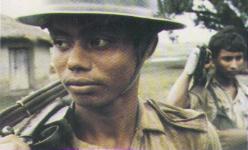|
|
 |
|
|
Muktir Gaan is a documentary film which explores the impact of cultural identity on the 1971 Bangladesh Liberation War, where music and song provided a source of inspiration to the freedom fighters and a spiritual bond for the whole emerging nation. A group of Bengali cultural activists travel through refugee camps and battle zones performing rousing songs which capture the essence of the Bengali nation. Directors Catherine and Tareque Masud used original footage by American film-maker Lear Levin, as well as other archival footage collected from the UK and India.
Tareque Masud has been actively involved in the alternative film movement in Bangladesh. He is a founding member of the Short Film Forum, the forum for alternative filmmakers in Bangladesh, and in 1988 served as Coordinator of the First International Short Film Festival held in Dhaka. He has also directed a number of short, documentary and animation films. Catherine Masud has spent several years living and working in Bangladesh, and has worked on a number of film projects including documentaries, animations, and short fictions. She also works as a consultant specialising in multimedia. She and her husband Tareque live in Dhaka, where they run Audiovision, a production company. Read review by Naeem Mohaiemen: |
|
Oct 18th,
Friday, 7 PM FREE Co-sponsored
by |
 MUKTIR
GAAN
MUKTIR
GAAN  This
film, 25 years in the making, began with the ambition of Lear Levin,
an American filmmaker, to make an epic documentary in the tradition
of Robert Flaherty on the Bangladesh Liberation War of 1971. Levin
and his crew came across a troupe of travelling musicians, members
of a larger cultural movement known as the Bangladesh Mukti Sangrami
Shilpi Sangstha, who were traversing the zones of war singing songs
of struggle to inspire the guerrilla cadres and the millions of
refugees. Levin, who did not know any Bengali, followed this troupe
and captured the spirit of the Bengali people through 20 hours of
beautifully photographed footage. However, he became so caught up
in filming that he returned to the US only just as the war was coming
to an end. He was unable to get funds to complete the project and
for 20 years, the footage lay in storage in his basement in New
York.
This
film, 25 years in the making, began with the ambition of Lear Levin,
an American filmmaker, to make an epic documentary in the tradition
of Robert Flaherty on the Bangladesh Liberation War of 1971. Levin
and his crew came across a troupe of travelling musicians, members
of a larger cultural movement known as the Bangladesh Mukti Sangrami
Shilpi Sangstha, who were traversing the zones of war singing songs
of struggle to inspire the guerrilla cadres and the millions of
refugees. Levin, who did not know any Bengali, followed this troupe
and captured the spirit of the Bengali people through 20 hours of
beautifully photographed footage. However, he became so caught up
in filming that he returned to the US only just as the war was coming
to an end. He was unable to get funds to complete the project and
for 20 years, the footage lay in storage in his basement in New
York.  In
1990, the directors tracked Levin in New York with the intention
of making a film based on his footage. It took five years to complete
the film which includes archival material on the major events of
the war from archives around the world to supplement Levin's footage
of the troupe.
In
1990, the directors tracked Levin in New York with the intention
of making a film based on his footage. It took five years to complete
the film which includes archival material on the major events of
the war from archives around the world to supplement Levin's footage
of the troupe.